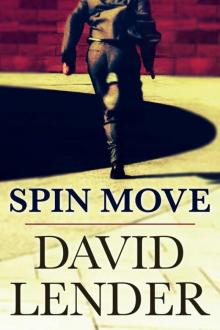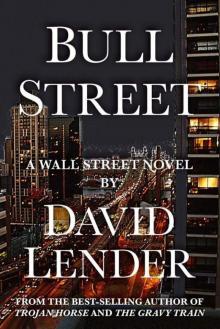- Home
- David Lender
Trojan Horse
Trojan Horse Read online
Trojan Horse
This novel was originally published, under a slightly different form, by Brindle Publishing in February, 2011.
Copyright © 2011 by David T. Lender
All rights reserved. No part of this book may be used, reproduced or transmitted in any form or by any means, electronic or mechanical, including photocopying, recording or by any information storage or retrieval system, without the written permission of the publisher, except where permitted by law, or in the case of brief quotations embodied in critical articles and reviews. For information, contact [email protected].
Cover photograph copyright © 2005 by Herman J. Lender
Published by Thomas & Mercer
P.O. Box 400818
Las Vegas, NV 89140
ISBN-13: 9781612182285
ISBN-10: 1612182283
Trojan Horse
A Thriller by
David Lender
Table of Contents
Copyright
Dedication
Also By David Lender
About The Author
Acknowledgments
Prologue
Book 1
Chapter 1
Chapter 2
Chapter 3
Chapter 4
Chapter 5
Chapter 6
Chapter 7
Chapter 8
Book 2
Chapter 9
Chapter 10
Chapter 11
Chapter 12
Chapter 13
Chapter 14
Chapter 15
Chapter 16
Book 3
Chapter 17
Chapter 18
Chapter 19
Chapter 20
Chapter 21
Chapter 22
Book 4
Chapter 23
Chapter 24
Chapter 25
Chapter 26
Chapter 27
Chapter 28
Chapter 29
Book 5
Chapter 30
Chapter 31
Chapter 32
Chapter 33
Chapter 34
Chapter 35
Chapter 36
Chapter 37
Chapter 38
Chapter 39
Chapter 40
Chapter 41
Chapter 42
Chapter 43
Chapter 44
Chapter 45
Chapter 46
Chapter 47
Chapter 48
Chapter 49
Chapter 50
Chapter 51
Chapter 52
Chapter 53
Excerpt from The Gravy Train
Excerpt from Bull Street
Excerpt from Vaccine Nation
For Grace Smith
ALSO BY DAVID LENDER
The Gravy Train
The Gravy Train is the story of a novice investment banker who helps an aging Chairman try to buy his company back from bankruptcy, pitted against ruthless Wall Street sharks who want to carve it up for themselves.
Bull Street
Bull Street is the story of a naïve, young Wall Streeter who gives a jaded billionaire the chance for redemption, as they team up to bring down an insider trading ring before they wind up in jail or dead.
Vaccine Nation
Vaccine Nation is the story of an award-winning documentary filmmaker who is handed “whistleblower” evidence about the U.S. vaccination program, and then races to expose it before a megalomaniacal pharmaceutical company CEO can have her killed.
ABOUT THE AUTHOR
David Lender is the bestselling author of thrillers based on his over 25-year career as a Wall Street investment banker. He draws on an insider’s knowledge from his career in mergers and acquisitions with Merrill Lynch, Rothschild and Bank of America for the international settings, obsessively driven personalities and real-world financial intrigues of his novels. His characters range from David Baldacci-like corporate power brokers to Elmore Leonard-esque misfits and scam artists. His plots reveal the egos and ruthlessness that motivate the players in the business world, as well as the inner workings of the most powerful of our financial institutions and corporations.
ACKNOWLEDGMENTS
First, thank you to Sidney Gruson, a dear friend from my Rothschild days, now departed. He sent an early draft of this novel to a number of friends, including Nick Gage. Nick sent it to a prominent literary agent he knew, Joni Evans, at what was then The William Morris Agency in New York, whose reaction was (I am paraphrasing), “Not bad for somebody who doesn’t know what he’s doing,” then offered to introduce me to some editors who could teach me. She did. So thanks to Nick, Joni and, most importantly, to Richard Marek, who was the editor I worked with over 18 months on this manuscript, and who taught me how to write a thriller.
To Michael Hauge of Screenplay Mastery, thank you, not only for coaching me on pitching my stories in person, but for your advice on punching up key elements of my story from a Hollywood perspective.
Next, thank you to those who transcribed and typed: Julie Widmer, Madelynne Sansevere and Marcie Herkner. And to those who read, supported and commented: noteably, Grace Smith, Michele Young, Nick Gage, Geoff Selzer, Ira Schwartz, Penny Page, Mark Lender, Paul Lender, Mom and Dad.
And to George Philhower, who professionally formatted the original cover. I have a pillow in my den at my weekend house in Milford that is embroidered with the phrase, “Old Friends are the Best Friends.” True.
Thank you to Amazon Publishing.
And finally, to Dad, for the legacy of his many gifts, including his photographic eye and all those slides, negatives, prints and JPEGs, including the one on this cover, “The Man in White.”
PROLOGUE
JULY, TWENTY YEARS AGO. RIYADH, Saudi Arabia. Omar pressed the button that activated the lighted face of his watch, cupping his hands so he wouldn’t be detected. Today is a good day to die, he recited the mercenary’s creed in his head. 0158 hours. The others would start to arrive momentarily. He pulled out the American-manufactured night-vision goggles and stood in the shadows across the street from the outside perimeter wall of the grounds of the Royal Palace. He felt the chill of the Saudi night. He was grateful for the warmth provided by his German kevlar vest and British army fatigues beneath his robe, the traditional Saudi dress he wore as a disguise. Still, his Russian army boots were ridiculously obvious; the disguise wasn’t about to fool anyone.
He scanned the street from where he knew the others would be joining him. Still no one. His mouth was dry. He fingered the Uzi clipped to his belt on his left hip, the .45 automatic Colt holstered on his right hip. Then behind the Colt the .22 caliber Beretta with its silencer extending through the hole in its holster. Omar was the only one of the team of twelve who carried a Beretta. He was to be the shooter.
Two men walked toward him, shielded by the shadows against the wall. He motioned to them and they gestured back. It was time. The other nine appeared like a mirage in the desert. Each was armed with Uzis and .45 caliber automatic Colt pistols; two carried American M-203 grenade launchers. All were eclectically uniformed and hardwared to defy nationalistic identification if killed or captured. They waited silently against the wall, listening for the passage of the patrol jeep. It lumbered by, bearing two heavily armed guards.
Omar raised his hand: the “Go” signal. He felt his pulse quicken and the familiar butterflies and shortness of breath that preceded any mission, no matter how well planned. The twelve-member squad crossed the street to the white stucco perimeter wall of the palace. Four faced the wall and leaned against it, shoulder to shoulder. The others performed a series of acrobatic maneuvers and materialized into a human pyramid. The top man silently secur
ed three rubber-coated grappling hooks with attached scaling lines to the top of the wall. Omar was over the top and down the other side in less than fifteen seconds.
While the others followed, Omar pulled off his robe. His heart pounded. He pulled five bricks of C-4 plastic explosive from his pouch and stuck them to the wall in an “X” configuration, aware that his palms were clammy. He wiped them on his robe and again focused on his work. He inserted an electrical detonator in each brick of C-4, and wired them to a central radio receiver that he inserted into the center block of the “X.” By the time he finished, the rest of the team had cleared the wall and removed their robes. They stashed their robes in zippered pouches buckled to the backs of their waists.
Omar squinted at the wall of the palace, illuminated by floodlights, fifty meters away. This area had no first-floor windows. His eyes adjusted to the light, and he looked for guards he hoped wouldn’t be there. He focused on a second-floor window at the junction of the east and north walls. Be there, he thought. Just be there.
Sasha didn’t awaken at 2:00 a.m. as she had intended: she hadn’t slept at all. She glanced to her right at Prince Ibrahim, illuminated in the light from the display of the digital clock. His body moved up and down with the rhythm of his breathing. Sasha had earlier treated him to some extended pleasures in an effort to assure he wouldn’t awaken at an inopportune moment. She smelled the pungent scent of the evening’s energies, felt the smooth silk of the sheets against her naked breasts: sensations that under other circumstances would cause her to revel in her sexuality. Now she felt only the flutter of apprehension in her stomach. She thought of the business to be dispensed with.
The Royal Palace was stone quiet at this hour. Sasha listened in the hall for the footsteps of the guard on his rounds. A moment later he passed. A renewed sense of commitment smoothed a steadying calm down her limbs. It’s time, she told herself, and she slid, inches at a time, from the sheets to the cool marble floor.
Yassar will never forgive me. She breathed deeply, then felt exhilaration at the cool detachment her purpose gave her. She stood, naked, shoulders erect and head back, observing Prince Ibrahim, the man she had served as concubine for three years. But you don’t deserve to see it coming.
Backing from the bed, Sasha inched toward the closet. The prince stirred in his sleep, inhaled and held it. Sasha froze in place. She felt her stomach pull taut and she held her own breath. The cool marble under her feet became a chilling cold, the silence an oppressive void. This mustn’t fail. The prince resumed his rhythmic breathing and she exhaled in relief.
One more cautious stride carried her to the closet. She reached into it for her black abaya, the Muslim robe she wore in the palace. She cringed at the rustle of the coarse fabric as she put it on. The prince didn’t stir. She picked up her parcel from the closet floor, crossed the room and slipped out the door.
At the corridor window, she removed the clear plastic backing from one side of a 2×5 centimeter adhesive strip. The acrid odor of the cyanoacrylate stung her nostrils. She slid the strip between the steel window frame and the steel molding around it, precisely where the pressure-sensitive microswitch for the alarm sat.
She took an electromagnet from her parcel and plugged it into an outlet, unraveling the cord as she walked back toward the window frame. She placed the magnet against the corner of the window frame behind the alarm microswitch and clicked on the electromagnet.
The force of the magnet jolted the molding against the window frame. She endured a count to thirty until the adhesive fused the microswitch closed, then switched off the magnet. She turned the window latch, took a deep breath, shut her eyes, pushed. The window opened. No alarm.
The face of the man she knew only as the squad leader popped into her view from his perch atop his team, who had formed a pyramid on the wall below. She stepped back from the window. In an instant he was inside, raising his finger for her to be silent, and then turning and attaching one of the grappling hooks to the window frame. Never mind shushing me, she thought, just make sure you know what you’re doing. Within sixty seconds the other eleven members of the squad stole inside. The rope was up and deposited on the floor and the window closed and latched.
The black-haired girl backed herself against the wall, her palms against the marble. Omar stared into her jet-black eyes, saw her fierce spirit. That was close, he thought. She nearly blew it. Late. He sensed her excitement in the heaving of her chest, but she appeared otherwise to be in complete control of herself. She raised her chin defiantly. He looked into those penetrating black eyes again. Black steel, he thought, and felt a fleeting communion with her. She motioned with her eyes in the direction of Prince Ibrahim’s chamber. He nodded.
Sasha stood with her back pressed against the wall and watched as the team leader made hand signals and head motions to his men. He ordered a group to stand guard, then led most of them down the labyrinthine passageways that rimmed the outside perimeter of the palace toward Prince Ibrahim’s chamber. She watched the team leader disappear from sight around the first turn of the corridor. For some reason Sasha was seized by the premonition that something was wrong. She pushed herself out from the wall, trotted toward the prince’s chamber.
One of the team members, who had spread themselves in pairs in firing position, grabbed her by the wrist as she passed. A bolt of adrenaline coursed through her. She clenched her teeth and shot a glare at the man. His widened eyes showed fear. She jerked her arm away and continued. She was now aware of the exhilaration of life-threat and the calm purpose that drove her.
He’ll never forgive me, again crashed through her consciousness. It sucked the strength from her, but she kept on. She reached the next turn, the last before Ibrahim’s chamber and saw the team leader ten feet from the door. At that moment three Saudi guards bustled around the next turn in the corridor. She felt hot blood rush to her face and a charge of anger erupt from her chest. She saw two of the squad members three meters beyond the team leader rear their heads back like horses at the sight of fire, then crouch over their weapons.
Shots hissed from the two squad members’ silenced Uzis. The three Saudi guards were hurled backward in a spray of blood amid the crack of bullets ricocheting off the marble walls. Their bodies hit the floor with thuds. Two more Saudi guards materialized at the same turn, M-16s aimed from the waist. Bursts from their guns flashed stars of flame from their barrels and flattened the two squad members. The squad leader froze, the hesitation of death, five feet from the prince’s door. An instant later twin bursts from the Saudi guards’ weapons slammed him backward into the wall.
Sasha forced herself to bury her panic within her. Next she was aware of the rush of her own breathing and the momentary sense she should conceal herself behind a tortured wail. Instead, she stretched out an arm and raised a hand toward the guards. They lowered the muzzles of their automatics and nodded to her in recognition. She pressed her back against the marble wall, her feet inches from the pool of blood that oozed from the team leader’s body.
“More!” she called in Arabic and motioned with two fingers back down the corridor toward the window she had opened. The men nodded again, crouched over their weapons and trotted toward the turn in the corridor. She squinted at the two guards as they passed, seeing the panic in their faces, and resisting her own urge to flee. She slid down the wall, noting the Beretta and silencer protruding from the team leader’s holster.
This mustn’t fail, she told herself again. She yanked the Beretta from the team leader’s belt and gave the silencer a jerk counterclockwise to make certain it was anchored in place. Then she held the gun at arm’s length with both hands and fired one round into the back of the first guard. She saw the startled look of terror in the eyes of the second as he turned. She aimed the gun at his chest and pulled off two more rounds.
Three gone, five rounds left. She ran up to the two fallen men with the gun outstretched. The second one down didn’t move, the first did. She put another round in the
back of his head. She spun and darted toward Prince Ibrahim’s chamber, gulping air in huge breaths as she thrust herself through the door. The glow from the digital clock outlined the shape of the prince, who sat upright in bed, staring directly at her. She raised the gun at his chest. “Pig!” she said in Arabic.
“Sasha, I don’t understand,” the prince stammered.
“Then you don’t deserve to,” she said, and pulled the trigger. He lurched backward onto the pillows. A circle of red expanded on his white nightshirt directly over his heart. Sasha stepped forward, lowered the Beretta and fired another round into the Prince’s skull just behind his right ear. Then she dropped the gun.
Her brain told her what to do next—run for the window at the end of the corridor, throw down the rope and escape—but her body wasn’t nearly as composed as the voice in her head. Her breath came in gasps, her stomach churning at the smell of the blood puddled on the floor as she passed the bodies toward the first turn in the corridor. She shot a glance over her shoulder. Still no other guards. Thank God. She heard a crackle of static from a portable radio on the squad leader’s belt and heard the words, “We are blown! We have casualties and are aborting! Prepare transport! Minutes one!” Seconds later she heard shots and screams from someplace. An alarm sounded and the corridor lights flashed on. As she reached a turn in the corridor, one of the squad members must have triggered the C-4, because a yellow-white glare flashed as bright as the sun. A shock wave whooshed down the corridor and threw her over backward to the floor.

 Arab Summer
Arab Summer Sasha Returns
Sasha Returns Spin Move
Spin Move Bull Street (A White Collar Crime Thriller)
Bull Street (A White Collar Crime Thriller) Vaccine Nation
Vaccine Nation Trojan Horse
Trojan Horse